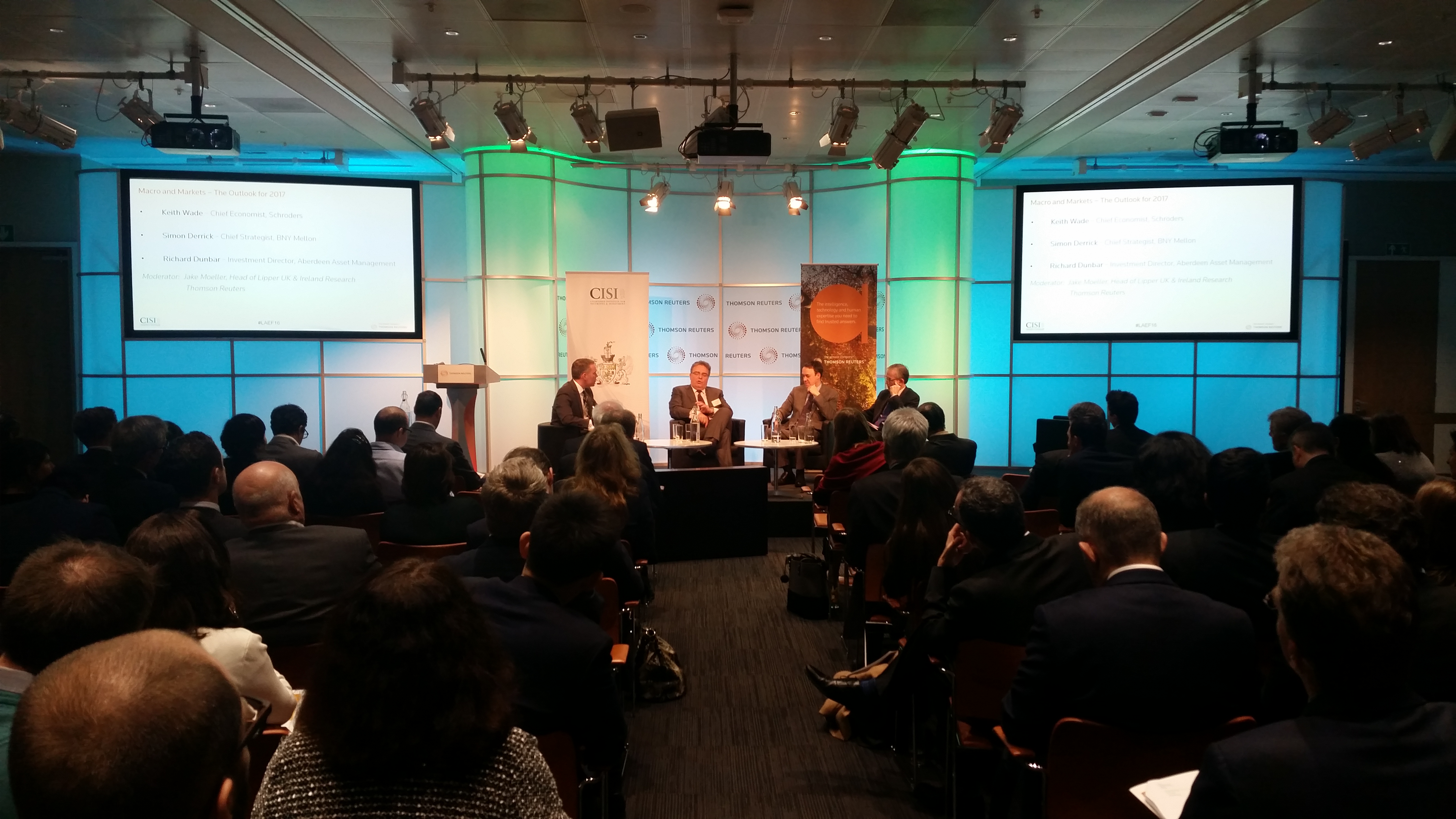The Lipper Alpha Expert Forum in London has earned a reputation as one of the European mutual fund industry’s premier thought-leadership events.
Our eleventh annual event–held in London on November 16, 2016–was no exception, and we were proud to welcome some of the preeminent industry executives in Europe to share their views on key developments affecting the European mutual fund industry.
Once again we partnered with the Chartered Institute of Securities and Investment–the leading professional investment body in the U.K.–as our co-hosts, and a full house in the Thomson Reuters Auditorium ensured a lively debate.
The evolution of ethical investing to ESG and beyond
The morning’s first panel session was moderated by Lipper’s Head of EMEA Research, Detlef Glow, who welcomed Ryan Smith – Head of Corporate Governance; Kames Asset Management, Andrew Parry – Head of Equities; Hermes Investment Management; and Wolfgang Pinner – CIO, Responsible & Sustainable Investing, Raiffeisen Capital Management.
The panel was extremely optimistic about the continuing growth in popularity of environmental, social, and governance (ESG) investing–especially with “Millennial” investors, but it cautiously warned that fund groups need to “deliver ESG, rather than merely marketing it.”

(L-R) Detlef Glow interviews Wolfgang Pinner, Andrew Parry & Ryan Smith
The panel argued that performance for funds with an ethical or ESG screen need not be compromised by portfolio restrictions, with a consensus that such criteria are actually very good for generating strong performance outcomes.
The conclusions were that the industry has developed substantially from the days of simple ethical screening, with engagement being much more thoroughly incorporated across fund groups’ investment processes.
Concepts such as “impact investing”–although often hard to define–are no longer nebulous concepts, and investors themselves are demanding ESG criteria-led investments.
The European flows environment
Detlef Glow outlined key patterns of flows into mutual funds in 2016. He noted that European fund net flows to the end of third quarter 2016 had seen bond funds, with over €60 billion, dominate. As confirmation of a “risk off” environment the second most popular category–with over €30 billion net–was money market funds. European equities, with over €10 billion of net outflows, suffered the most.

Jake Moeller highlights UK fund concentration.
Jake Moeller, Head of Lipper U.K. & Ireland Research, examined some specific trends in the U.K., pointing out the ongoing popularity of absolute return-type products, which collected over £4 billion net year to date, despite having an average performance of only 1% over the same period.
He also highlighted the concentrated nature of the U.K. funds market, outlining that–of the £990 billion sitting in the 6,000 mutual funds domiciled in the U.K.–the 50 top funds contain nearly a quarter of these assets.
The passive ascendency
Detlef Glow moderated a panel session with Mark Fitzgerald – European Product Manager, Vanguard; Thomas Merz – Managing Director & Head of ETFs Europe, UBS; Michael Gruener – co-head of EMEA sales, iShares; and Eric Wiegand – ETP Strategist, db X-trackers.
The panel confirmed that ETF growth will continue and that both price compression and further innovation will characterize the next few years. Picking up on points raised in the ESG panel, there was discussion around the potential for ESG criteria to be incorporated into passive or rules-based structures. This would likely be a forthcoming innovation.

(L-R) Detlef Glow interviews Mark Fitzgerald, Eric Weigand, Thomas Merz & Michael Gruener.
The active and passive debate was covered, with the panel arguing that if beta and then factors generate the bulk of returns, active managers may struggle to justify their costs in seeking alpha.
Some of the panellists were dismissive of the argument that some sectors (e.g., emerging markets) are more fruitful than exchange-traded funds (ETFs) for active managers.
Detlef highlighted data showing 2015 saw the highest net inflows into passive vehicles in Europe (about 30% of total net flows) in recent years. The panel agreed that this trend likely will persist.
2016 macro review and outlook for 2017
The final session saw Jake Moeller moderate the popular macroeconomic outlook session with Keith Wade – Chief Economist, Schroders; Simon Derrick, Chief Strategist at BNY Mellon; and Richard Dunbar – Investment Director – Aberdeen Asset Management.

(L-R) Jake Moeller interviews Simon Derrick, Keith Wade & Richard Dunbar.
The “Brexit” vote and the U.S. presidential election outcome dominated the conversation, with the panel agreeing that since the China “wobble” of summer 2015, the market has been dominated by a number of unusually material macro events. The panel believed it is likely political risk will be more tightly priced in 2017 but that–against a backdrop of weak growth and real wages growth–political risks remain high.
The effectiveness of central bank policy was discussed, with some credit being given to the Bank of England, the European Central Bank, the Bank of Japan, and the U.S. Federal Reserve, despite the distortion across yield curves.
In conclusion, the panel slightly favored risk assets such as dividend-paying equities over bonds but believed the high-yield bond market will offer some opportunities in a “lower for longer” rate environment.
Same time next year
All the sessions experienced a high level of audience engagement, with lively questions and debate contributing to the success of the event. The three hours of Continuing Professional Development credit allocated to the event by CISI were well earned.

A packed house engages in the debate.
A live “Twitter Wall” proved popular during the event, with considerable comment and photos being posted via #LAEF16. At one point, this hashtag was the third highest trending in the U.K.
We think it is a tribute to the reputation of Lipper that we are able to gather such an acclaimed list of panellists to this annual event. Our considerable gratitude is extended to all the panellists who generously provided their time and thought leadership.
It is vital to the industry that their experience and knowledge is shared.
We look forward to welcoming you all next year!
Sign up for weekly updates on fund markets and investment opportunities here.







